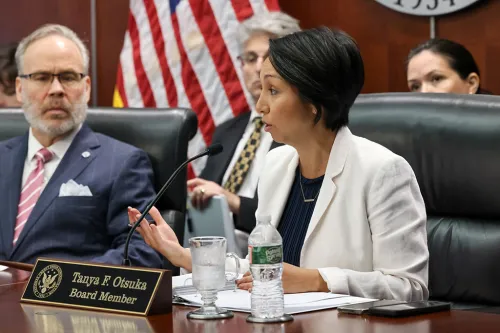NCUA Board Member Tanya F. Otsuka during a meeting of the NCUA Board.
As Prepared for Delivery on July 18, 2024
Thank you, Amanda, Ariel, Gira, and John, for your presentation on the notice of proposed rulemaking to address incentive-based compensation arrangements.
Finalizing this rule is a long time coming. As Chairman Harper noted, this Sunday marks the 14th anniversary of the passage of Dodd-Frank. In other words, for twelve years, the federal financial regulators have failed to implement this crucial regulatory tool that Congress tasked us with doing. Hopefully we are on the way to changing this, as the NCUA joins the FHFA, OCC, and FDIC in re-proposing this rule today. I urge our colleagues at the SEC and the Federal Reserve to do the same.
As many of you have heard me say, two of the defining moments of my career were working in the aftermath of the Global Financial Crisis at the FDIC and dealing with the failure of Silicon Valley Bank while working for the Senate Banking, Housing, and Urban Affairs Committee. In both cases, we saw bank CEOs get paid millions as their banks failed, often in the form of bonuses or incentive-based pay.
If your institution fails on your watch and you still receive your incentive-based pay, I am not sure what exactly you’re being incentivized to do.
At the time of its collapse, SVB had 31 unresolved supervisory warnings.1 Still, the CEO Greg Becker received a $1.5 million bonus as part of his 2022 compensation package that was worth about $10 million in total.
Many of us also vividly remember when Wall Street CEOs still got their bonuses even as their companies needed billions of taxpayer rescue dollars to stop the bleeding during the financial crisis. We, as regulators, need to be able to ensure that incentive-based pay actually incentivizes prudent management and aligns with safe and sound banking practices.
In the credit union space, we are seeing both a rise in total executive pay and incentive-based pay. Data from the 2023 CUES Executive Compensation Survey, show that executive pay among credit unions has increased on average by eight percent from the previous year.2 Industry experts have noted that historically credit union CEO pay grew annually by three to four percent.
The survey also showed that bonuses account for 20-25 percent of the total compensation for executives at credit unions. Another industry survey published in 2022 showed that 25 percent of CEOs at credit unions with over $1 billion in assets received long-term incentives, up from just 10 percent of CEOs in 2017.3 And the number of credit unions with assets equal to or greater than $1 billion are increasing at a steady rate. Between the year 2000 to March 2024, the United States has gone from having 43 credit unions with over $1 billion in assets to 443. In the last five years alone, we have seen 133 credit unions cross the $1 billion mark.
Given these trends, it makes perfect sense that the rule would only apply to the largest credit unions, those with $1 billion in assets and above. These are not small credit unions with just a handful of employees and volunteers – frankly, the leadership at many small credit unions are probably not getting paid enough. This rule would apply to some of the most complex credit unions whose mismanagement or failure could send shockwaves through the entire credit union system.
This coincides with the fact that we are experiencing a wave of retirements in our leadership ranks among credit unions, and thus credit unions need to be able to attract and retain talent. Offering incentive-based pay is one way to do so. In that sense, it is fitting that we are voting on both the succession planning and incentive-based pay proposal today, as both rules provide additional stewardship as our credit union system continues to grow.
To that end, the proposed rule aims to put more safeguards in place to ensure incentive-based pay is aligned with the proper incentives, such as sound governance practices and risk-management controls. It includes prohibitions intended to make these compensation arrangements more sensitive to risk, such as banning incentive-pay that do not include risk adjustment of awards, deferral of payments, and forfeiture and clawback provisions. These prohibitions would help safeguard credit unions from the types and features of incentive-based compensation arrangements that encourage inappropriate risks. We want credit union management to be adequately compensated and be able to attract and retain talent. However, it is our job as the regulator to ensure that credit unions are doing so in a prudent way to protect our system of cooperative credit.
For these reasons, I strongly support the reproposal.
1 Allison Morrow, CNN, Failed bank execs see blame everywhere, except in the mirror, May 2023.
2 Diane Franklin, CU Management, Solid Gains Continue To Boost Executive Pay Levels, Oct 2023.
3 Katrina Gerenz, Ryan Gildner, AON, The Trend Towards Long-Term Incentives at Credit Unions, Jan 2022.



